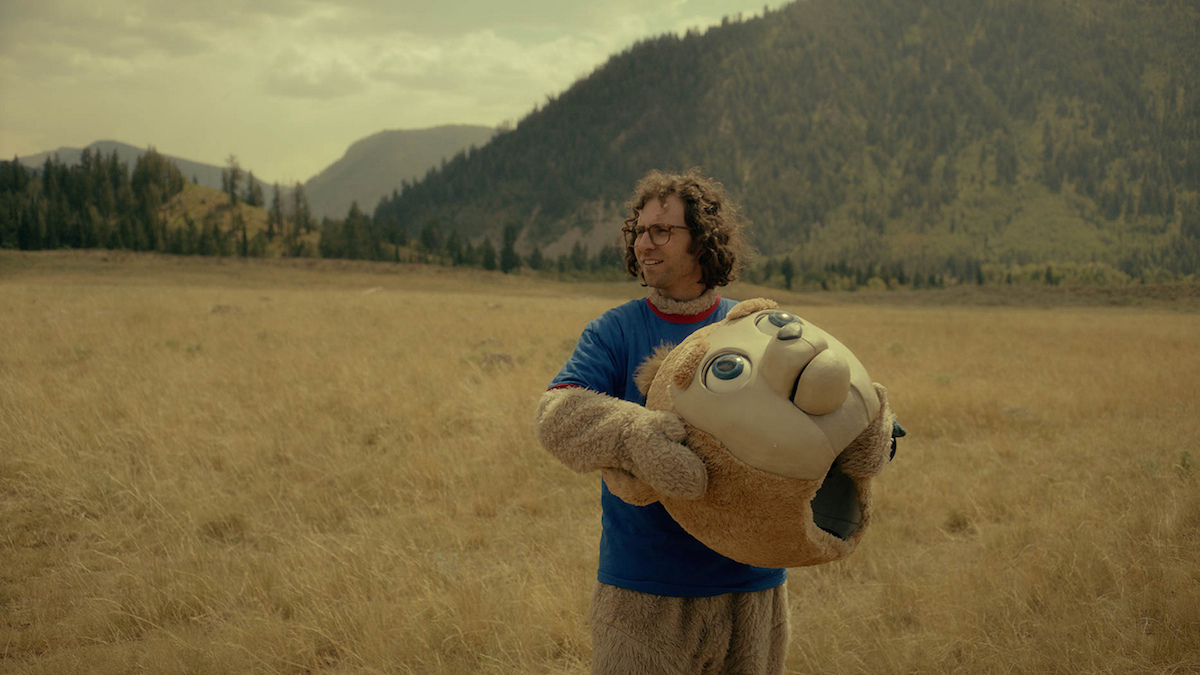One of the most original yet accessible comedies to play either festivals or multiplexes in recent years, this overdue breakout moment for the fresh and incredibly talented Kyle Mooney is a hilarious take on the common theme of arrested development, gorgeously expanded to a story about the freedom of creativity.
In a fittingly strange opening, director Dave McCary’s “Brigsby Bear” (playing Sundance in the U.S. Dramatic Competition category) starts with a cold open: a two-minute presentation of the title TV show, which we quickly realize must be a worn-down VHS copy, given the way the audio track fluctuates, and that some scenes are fast forwarded. It’s a live-action children’s show about the title galactic bear (a giant costume) his two women sidekicks and an evil sun. The production quality and special effects look incredibly cheap, and after Brigsby saves the day, it ends with a weird math equation. While signing off, Brigsby then says something along the lines of “Curiosity is an Unnatural Emotion,” and something about respecting your parents.
The next shot is of Mooney’s face, gazing at the screen like Spielberg characters do at extraterrestrials. We then glimpse at his room, covered with Brigsby Bear merchandise: posters, towers of VHS tapes and books, action figures, lamps, etc. After seeing the world of Brigsby, we see James’ world: a bomb shelter-looking place, contained by his parents (Mark Hamill and Jane Adams) in the desert. James’ boyish nature, stumbling over himself to talk about very specific Brigsby references at the dinner table, becomes a tender yet literal expression of immaturity as self-containment.
His happy life is changed forever when police show up to the shelter home, revealing to him that his parents are actually his captors. Soon into getting back to the life of his family (his parents played with gentleness by Matt Walsh and Michaela Watkins, his sister with sharpness by Ryan Simpkins), he learns that this entire franchise existed just for him. After his father introduces James to the idea of movies—created by anyone, seen by all—James decides to finish the Brigsby story himself.
I had the fortune of seeing this film at its Sundance world premiere, without any idea as to what it would be, so I won’t spoil more of it from here (as much as I’d love to point to numerous scenes that had me laughing hard, while caring about James even more). But I love that David McCary’s direction is energized by the feeling of adventure: As James is learning about society, “Brigsby Bear” is consistently eye-opening, taking on starkly different tones and then surprising with its narrative choices. McCary gives us vivid settings with gorgeous moments, from the emotional safety of the bomb shelter, to the culture shock of being reunited with his parents in their home, to the freedom of the picturesque Utah outdoors. Throughout all of this, “Brigsby Bear” is extremely clever with its comedy, driven entirely by the character of what James has and has not experienced in life.
Mooney gives one of the most dynamic lead comedic performances in years, a fully realized idea of a character new to social constructs and how the world works. (In fish-out-of-cultural-water stories, this movie is more “Being There” than it is “Encino Man.”) As a character confused more by new life experiences than the kidnapping that makes him a bit of a local celebrity, Mooney plays each moment with impeccable control, making dark and tender humor out of his remarks that come from earnest naiveté. He’s like a brilliant mix of boyish Andy Samberg characters with the innocence of Wall-E, his eyes constantly opened but referring back to the pop culture and past life he had known for so long. Mooney’s incredibly confident performance, of which the film excels with by putting him in almost every frame, establishes a crucial sincerity to its concept. That sincerity creates our own desire for his mental journey, to see him find a balance between his passion for Brigsby and connecting with the outside world.
“Brigsby Bear” is warmed by a great supporting cast, who add to the heartfelt absurdity: Greg Kinnear is extremely funny as a former Shakespearean actor who took a job in the real world—as a police officer—and has access to the Brigsby props from the evidence locker. The big stand-out, oddly enough, is superstar Mark Hamill, who is perfectly cast for a movie about a young man living his entire life for a franchise. He brings so much heart as a father figure to James. Mooney and Hamill only have a few scenes together, but their scenes define the emotional delicacy of “Brigsby Bear” that will completely catch you off guard and move you.
The script, with the story credit going to Mooney who co-wrote the story with Kevin Costello, is so original with a seemingly simple concept that its climax is oddly its weakest feature. Viewers familiar with past Sundance dramedies might recognize hints of “Me, Earl and the Dying Girl” (not the dying girl part, mind you), even though the journey to the big finale is so thoroughly charming.
Watching the world premiere of “Brigsby Bear” must have been what it was like to see a Sundance classic like “Napoleon Dynamite” for the first time (and as an everlasting fan of that film, “Brigsby Bear” could very well be the next “Napoleon Dynamite”). It’s not often you discover a movie with as fresh a vision on familiar themes, layered with ideas about maturity, fan culture, creative passion and even the support of family. “Brigsby Bear” is the rare comedy—one of a very special sense of humor and a big heart—that has the ability to connect with anyone wondering what else is out there.












